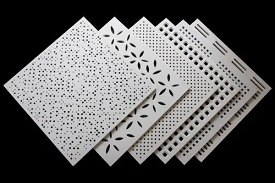
Glass fibre reinforced gypsum (GFRG) panels are innovative construction materials made by embedding glass fibre reinforcement within a gypsum matrix. These panels combine the strength and durability of glass fibres with the versatility and workability of gypsum, resulting in lightweight yet robust building components. GFRG panels are manufactured through a process where a mixture of gypsum plaster and glass fibres is poured into molds and allowed to cure. The resulting panels exhibit high strength-to-weight ratios, making them suitable for a variety of structural and non-structural applications in residential, commercial, and industrial construction projects. GFRG panels offer advantages such as fire resistance, mold resistance, and acoustic insulation properties. Their smooth surfaces allow for easy finishing with paints, textures, or veneers to achieve desired aesthetics. With their versatility, durability, and environmental sustainability, GFRG panels are increasingly recognized as a viable alternative to traditional construction materials for walls, ceilings, partitions, and facades.
IS 17400:2021 holds immense importance in regulating the quality and safety of glass fibre reinforced gypsum panels, which are vital components used in construction for various applications such as wall partitions and false ceilings. This standard serves as a critical guideline for manufacturers, outlining specific requirements for raw materials, manufacturing processes, dimensions, and physical properties of GFRG panels. Adhering to IS 17400:2021 ensures that manufacturers produce panels meeting stringent quality benchmarks, guaranteeing their durability, strength, and fire resistance in diverse building applications. Compliance with this standard not only ensures the structural integrity of constructions but also promotes safety by regulating factors such as load-bearing capacity and resistance to environmental conditions. IS 17400:2021 fosters consistency and uniformity in the production of GFRG panels, facilitating their seamless integration into construction projects while ensuring compatibility and reliability.
Note: Obtaining the ISI/BIS Certification is a mandatory requirement for manufacturers of Glass Fibre Reinforced Gypsum Panels to sell their products in the Indian market.
In India, manufacturers must obtain ISI/BIS certification for their Glass Fibre Reinforced Gypsum Panels to legally sell these products. This certification, mandated by Indian regulations, ensures compliance with specific quality and safety standards established by the BIS for the production and distribution of glass fibre reinforced gypsum panels. Without this certification, manufacturers face legal repercussions and barriers in accessing the Indian market. Therefore, securing ISI/BIS certification is not only a regulatory requirement but also a crucial step for manufacturers to demonstrate the reliability, durability, and safety of their glass fibre reinforced gypsum panels. This certification process underscores the importance of ensuring the integrity and quality of construction materials, instilling confidence among stakeholders in the construction and building industries regarding its compliance with Indian standards for usage and distribution.
Indian Standards Institute, or ISI was renamed the Bureau of Indian Standards (BIS) in 1987. The official mark that the Bureau of Indian Standards provides for manufacturers of various goods is the ISI Mark. It is used to indicate compliance with Indian standards (IS) set by the Bureau of Indian Standards (BIS) and has been used as a conformity marking for industrial products. Manufacturers received permission from BIS to use the ISI Mark on items that comply with relevant Indian requirements through the product certification program.
Only manufacturers (domestic or foreign) who produce the finished product will be awarded ISI Certification. This will not be given to any product importers, traders, dealers, or distributors.
The following documentation is required to get an ISI certification:
For more detailed information, please click here.
There are two approaches for Indian manufacturers to become certified with the ISI Mark:
Regular Procedure
With the possible exception of cases deemed "All India first," which might take up to 180 days, the licensing procedure is expected to be finished in 120 days. This timeline starts on the day the application is received, assuming that at different points in time the documentation, unit assessment, and product conformance are all deemed acceptable.
Step 1: Manufacturing Unit Customization in Compliance with Applicable Indian Standards
Step 2: Submission of the Application Form
For more detailed information, please click here.
Simplified Procedure
This is a much faster process than the standard procedure. After a factory inspection is deemed satisfactory and the initial evaluation establishes that the sample complies with the applicable Indian Standard(s), the license application process is expected to be finished in 30 days.
Step 1: Adapting the Manufacturing Unit to Comply with the Relevant Indian Standard
Step 2: Sample Testing
For more detailed information, please click here
The process of obtaining ISI Mark Certification for Foreign Manufacturers typically includes the following steps:
Step 1: Application
Step 2: Query Raised (If Any)
For more detailed information, please click here.
Brand Liaison provides helpful support for achieving ISI Mark Certification. Among our offerings are:
Please click here to get in contact with our team of specialists for a deeper explanation of the paperwork and steps needed to get ISI Mark Certification.